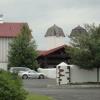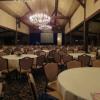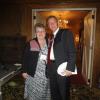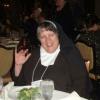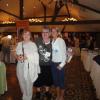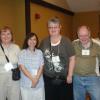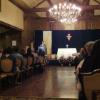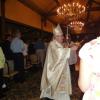
ToB Congress Report & Pictures
God, Sex and the Meaning of Life
Theology of the Body
We had an enlightening experience at the National Theology of the Body Conference. We recommended that anyone who can, attend next year.
Pictures:
1. Normandy Farm in Blue Bell, PA - it really looks like a farm
2. The meeting and eating hall - we sat at the back
3. Susan with Michael Waldstein - loved his talk
4. Sister Barbara Joseph - we shared the same table
5. Jan, Susan and Katrina Zeno - she was wonderful
6. Jan, Ellen Gable Hrkach, Susan & Tom - Ellen is an  award-winning author of the Catholic novels, Emily's Hope and In Name Only
award-winning author of the Catholic novels, Emily's Hope and In Name Only
7. The Hall ready for Mass - 50 priests concelebrated
8. Cardinal Rigali - Read his homily here
THEOLOGY OF THE BODY: WHY ALL THE HYPE?
Cardinal Rigali Affirms Importance of John Paul II's Teaching
By Genevieve Pollock
PHILADELPHIA, Pennsylvania, JULY 30, 2010 (Zenit.org).- A growing number of people, including Cardinal Justin Rigali, are affirming the importance of the theology of the body, as evidenced by a national congress that concluded today.
At this National Theology of the Body Congress, the first of its kind, ZENIT asked Cardinal Rigali, archbishop of Philadelphia, to explain what it is about these teachings of Pope John Paul II that is so important.
"The theology of the body is actually a great gift," he said.
The cardinal affirmed that "the theology of the body is a theological explanation of what God has revealed in the Scriptures and in tradition of the great dignity of human flesh."
He continued, "It is spelling out in its completeness what we already have in the Gospel of St. John, where he tells us that 'the Word became flesh.'"
"God's plan was that his own Son would take on human flesh, would take on a body, the fullness of the human body, in order to teach us the meaning of the human body, and in that way to teach us the full meaning of our humanity," the prelate explained.
He added, "This is what the theology of the body is: Spelling out, in many details, God's plan for humanity, God's plan revealed in creation, when he created man -- male and female he created them -- all of this is God's plan."
The theology of the body, Cardinal Rigali affirmed, "is an encouragement through an explanation, through a very good theological explanation."
He continued: "It is an encouragement to live according to God's plan for the human body, which has a purpose, which has a dignity; it has so much of a dignity that the Son of God took on human flesh."
"It is only when we realize that he took on human flesh," the cardinal noted, "that we are able to fully understand the meaning of the dignity of the human body."
Treasure
Katharine Blanchard, development director of the Philadelphia-based Theology of the Body Institute, which organized the congress, told ZENIT that Cardinal Rigali has been very supportive of the organization.
She said that as the head of the institute's episcopal board of advisors, which currently includes ten other prelates, the cardinal has been closely involved with the organization and meets regularly with its leaders.
In fact, Cardinal Rigali wrote a Jan. 21 letter of personal invitation to the congress, in which he stated, "I am convinced that John Paul II's theology of the body is a treasure for the Church and a gift of the Holy Spirit for our time."
He noted that it is "a beautiful foundation for the new evangelization and a particular message of hope for the world at this time," as it is "not only a catechesis on marriage and human sexuality, but also affords 'the rediscovery of the meaning of the whole of existence, of the meaning of life' (Theology of the Body 46:6)."
Many people responded promptly to the invitation and the congress quickly sold its 450 registration slots to people from ten different countries. Up to 100 people added their names to a waiting list for the chance of participating.
Numerous people worldwide were also able to follow congress talks and presentations online through live streaming on the Internet.
The three-day congress had four tracks: pastoral ministry, catechesis and evangelization, philosophy and theology, marriage and family.
One speaker, Sister Mary Elizabeth Wusinich of the Sisters of Life, told ZENIT that she saw this congress as a "watershed" event. Having served for nearly a decade as the director of the New York Archdiocese Family Life/Respect Life Office, she affirmed that in her experience, teaching the theology of the body is key in order to respond to the most urgent needs of society.
Sister Helena Burns of the Daughters of St. Paul, who also gave a presentation, agreed that the theology of the body is a remedy for many societal woes. She expressed hope at the fact that many people, especially in the English-speaking world, are beginning to pick it up.
Evangelization
The nun's words were illustrated by the various groups and organizations present at the congress, each with a different story of how it began to apply this teaching of John Paul II to daily life and to spread it to others.
Monica Ashour, executive director of the Theology of the Body Evangelization Team, told ZENIT about how her organization works with teens and adults throughout Texas, organizing study groups, retreats, and other events.
Laypeople in Cincinnati, Ohio, were present to talk about their newly-established education center, Ruah Woods, where they have already trained 400 students in the theology of the body since last year.
Brian Gail explained to ZENIT how the theology of the body played a significant role in the writing of his novel, "Fatherless," as well as two subsequent books he will be publishing soon.
Glenn Stanton, director for family formation studies at Focus on the Family in Colorado Springs, told ZENIT that the theology of the body has been the basis of a growing connection between Catholics and Evangelical Christians.
Jake Samour, director of the office of marriage and family life for the Archdiocese of San Antonio, Texas, emphasized the importance of John Paul II's teaching in reaching out to and educating the Hispanic community in the United States.
Other speakers included: Father Richard Hogan, author, editor and television host; Helen Alvaré, law professor and advisor of the Pontifical Council for the Laity; Father Thomas Loya; Janet Smith; Lisa Hendey; Brian Gail; Katrina Zeno; Pia de Solenni; Anastasia Northrop; Father Roger Landry; Peter Colosi; Bill Donaghy; Damon Owens; Michael Waldstein; Monica Ashour; Gregory Popcak; Glen Stanton; Jake Samour; Bob Schuchts; and Philip Mango.
As Cardinal Rigali stated in his letter, participants had many opportunities to receive the gift of John Paul II's teaching "more deeply, so as to proclaim it more effectively to the world."
